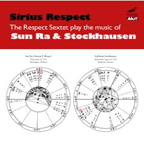Sirius Reviews
Since the release of Sirius Respect, we’ve had bunch of kind and thoughtful reviews. You can check out a nice selection of them on our press page. Here’s one of the most recent, from the July 2009 issue of Paris Transatlantic Magazine:
The Respect Sextet
SIRIUS RESPECT: THE RESPECT SEXTET PLAY THE MUSIC OF SUN RA & STOCKHAUSEN
Mode
The Respect [Sextet] have been going strong since 2001, having transferred their base of operations from Rochester to New York with the odd personnel change along the way; currently the band consists of Eli Asher (trumpet), Josh Rutner (tenor sax), James Hirschfeld (trombone), Red Wierenga (piano/keyboards), Malcolm Kirby (bass) and Ted Poor (drums). Their perpetual fondness for clunky puns in their CD titles disguises their increasingly distinctive performance style and serious delvings into the alt.jazz canon. Their earliest proper CD release, The Full Respect, was imaginative, fun, but rather glib; the follow-up live Respect in You was much more like it, and gave a taste of their real forte: long, slow-burn performances unpicking a single tune at leisure, as recognizable themes slip in and out of a conspiratorial haze of activity. Their affection for the ICP is often evident (they once celebrated Misha Mengelberg’s birthday with an evening of his tunes), and like the AACM they make frequent use of toys and homemade instruments.Sun Ra has been a Respect touchstone for a while: one of their occasional mini-CD bulletins was a 20-minute performance of “A Call for All Demons”. So it’s no surprise that this disc, their third full-length release, is in large part devoted to the Saturnian One’s compositions. It’s a lovely, gutsy idea to pair him with Karlheinz Stockhausen for this program. The connections between the two men are clear enough – notably, a grandiose self-created cosmology delivered with a straight face, and the somewhat cultish leadership of a clan/family of dedicated interpreters – but it’s still quite a stretch for a jazz group to deal with Stockhausen’s output, and the Respect have been very selective in what they tackle: mostly brief melodies from Tierkreis, plus “Dienstagslied” and the text-piece “Set Sail for the Sun” (given a luminous but far too short reading at less than six minutes). In point of fact, the Ra portion of the program far outweighs the other in terms of sheer running time, though at least the two streams converge briefly with the final track, a live performance collaging “Capricorn” (Tierkreis) and “Saturn” (classic late-1950s Ra, best known from its appearance on Jazz in Silhouette).
What seems to attract the Respect most with Ra isn’t the farthest-out stuff from the 1960s and beyond, nor his homages to Fletcher Henderson or Duke Ellington, but instead the areas where he seems prescient of the sharp end of the current jazz mainstream: a cutting-edge harmonic sense pushing bebop line-spinning into atonality, the use of electronic keyboards, experimentation with exotic time-signatures and percussion overlays. Some tracks are quite short and pointed – the opening blast through “Jet Flight” and the epigrammatic reading of “Velvet” – but others take longer durations to pull together their elements, offering something of the flavour of the group’s live performances (though this is mostly a studio album). The churning 7/4 line of “Shadow World” especially suits the Respect’s love of collagist mayhem, and their favourite strategem of letting a tune emerge sidelong from very oblique beginnings is evident on “El Is the Sound of Joy” (though when they finally lock into the stomping groove you wish it lasted longer). Perhaps the best compliment one can pay to their use of the Stockhausen pieces is that they fit right in–indeed, the staggering horn fanfares of “Dienstagslied” offer the most Arkestra-like moment on the disc.
Sirius Respect isn’t the group’s most impressive disc in terms of soloing – I’d direct you instead to Respect in You for some monstrous solo work by Asher, Rutner and Hirschfeld – but at least you get a better representation of their excellent pianist/synthesist Red Wierenga, who mostly stuck to the background on the earlier CD (probably because he was also responsible for the live recording). In any case, this is still a courageous, thought-provoking, and thoroughly enjoyable attempt to foster a dialogue between the musical legacies of its two dedicatees.
—Nate Dorward, July 2009
We hope you like it too – Please pick up a copy if you haven’t already!
And keep your ear to the ground for the next one…


